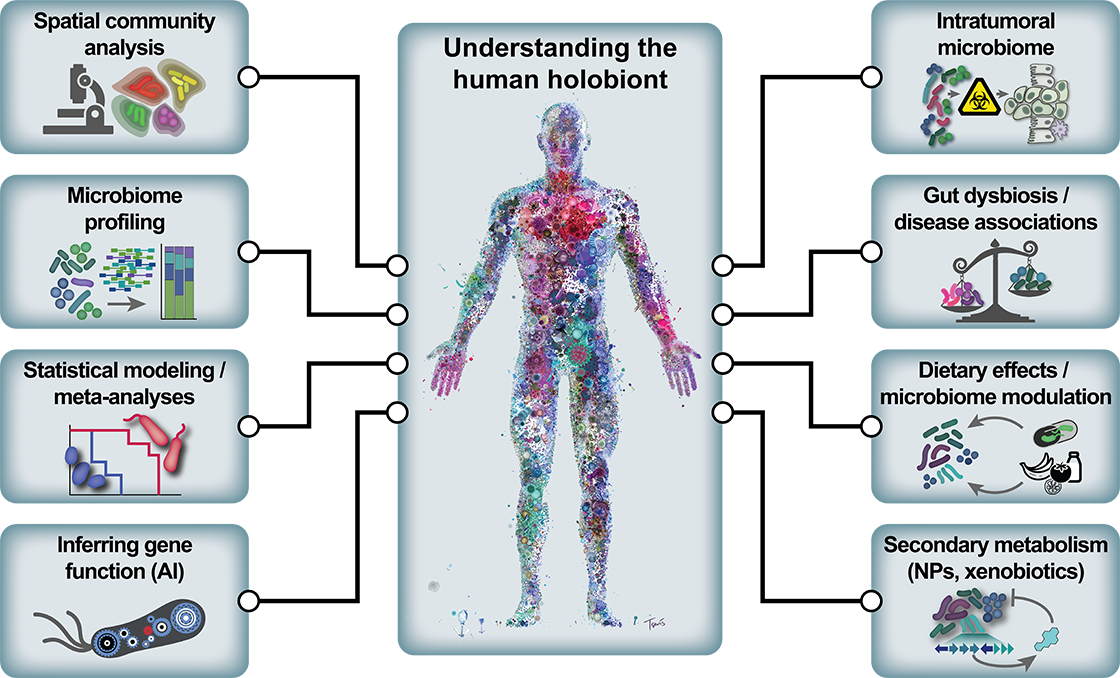Microbiome Systems Biology
Aim of the research
Our work aims to elucidate how the human microbiome impacts human health and disease. The Zeller Lab combines sequencing and imaging approaches with computational and statistical analysis techniques to study the composition, function and spatial organisation of the human microbiome. We strive for a more quantitative understanding of how host factors shape the microbiome (e.g. diet or medication), how microbes contribute to disease processes (e.g. cancer formation) and how we can harness microbiome modulation to restore human health or improve medical treatments.
…Our work aims to elucidate how the human microbiome impacts human health and disease. The Zeller Lab combines sequencing and imaging approaches with computational and statistical analysis techniques to study the composition, function and spatial organisation of the human microbiome. We strive for a more quantitative understanding of how host factors shape the microbiome (e.g. diet or medication), how microbes contribute to disease processes (e.g. cancer formation) and how we can harness microbiome modulation to restore human health or improve medical treatments.
To achieve these goals, we collaborate across disciplines with microbiologists, data scientists, and clinicians. We embrace open science principles to promote reproducible (computational) research. We support the microbiome research community by developing free software tools and through our participation in the Center for Microbiome Analyses and Therapeutics (CMAT), which provides
If you would like to learn more or are interested in working with us, please get in contact!

Group members
- Dr. Georg Zeller (group leader)
- Dr. Quinten Ducarmon (postdoctoral researcher)
- Dr. Laura Bornes (postdoctoral researcher and lab manager)
- Dr. Morgan Essex (project manager and postdoctoral researcher)
- Dr. Sankeert Satheesan (postdoctoral researcher)
- Martin Larralde (pre-doctoral researcher)
- Selin Pekel (pre-doctoral researcher)
- Raymund Hackett (pre-doctoral researcher)
- Patrick Wörz (pre-doctoral researcher)
- Iphigenie Gonnet (pre-doctoral researcher)
- Dr. Saul Pierotti (postdoctoral researcher)
Partners / collaborators
The group maintains strong connections to its roots in Heidelberg, Germany by collaborating closely with the European Molecular Biology Laboratory (Michael Zimmermann, Jan Korbel, Nassos Typas), the German Cancer Research Center (Jens Puschhof, Eran Elinav, and Mathias Heikenwalder), and the University Hospital Heidelberg (Matthias Kloor, Burckhart Toenshoff, Joe Simon).
Other close collaborators include Edu Villablanca (Karolinska Institute, Sweden), Stefania Giacomello (SciLifeLab, Sweden), Julio Saez-Rodriguez (EBI, UK), Sebastian Zeissig (University Hospital Greifswald, Germany), Shini Sunagawa (ETH Zürich, Switzerland), Dirk Haller (TUM, Germany), Tom Clavel (University Hospital RWTH Aachen, Germany), Ravid Straussman (Weizmann Institute, Israel), Tobias Gulder (Saarland University, Germany).
…The group maintains strong connections to its roots in Heidelberg, Germany by collaborating closely with the European Molecular Biology Laboratory (Michael Zimmermann, Jan Korbel, Nassos Typas), the German Cancer Research Center (Jens Puschhof, Eran Elinav, and Mathias Heikenwalder), and the University Hospital Heidelberg (Matthias Kloor, Burckhart Toenshoff, Joe Simon).
Other close collaborators include Edu Villablanca (Karolinska Institute, Sweden), Stefania Giacomello (SciLifeLab, Sweden), Julio Saez-Rodriguez (EBI, UK), Sebastian Zeissig (University Hospital Greifswald, Germany), Shini Sunagawa (ETH Zürich, Switzerland), Dirk Haller (TUM, Germany), Tom Clavel (University Hospital RWTH Aachen, Germany), Ravid Straussman (Weizmann Institute, Israel), Tobias Gulder (Saarland University, Germany).
In addition, the group has contributed to the following collaborative projects and consortia:
THRIVE (tumor-host interactions in liver cancer), BACTORG and Mi-EOCRC (bacterial pathogenesis and microbiome-based prevention of colorectal cancer, respectively), as well as CartoHostBug (decoding cellular and molecular gut microbiome-host interactions).